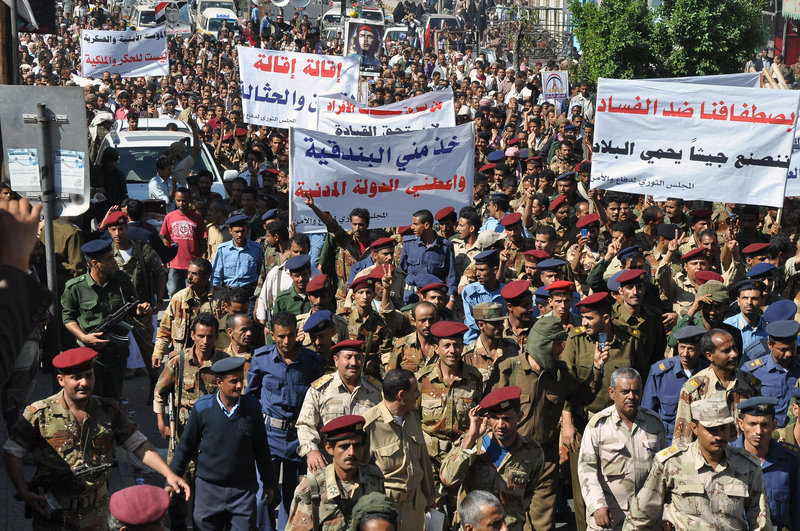SANAA, Yemen – Yemen’s outgoing president decided to stay in the country, reversing plans to leave, his ruling party said Saturday, in an apparent attempt to salvage his control over the regime, which has appeared to unravel in the face of internal revolts and relentless street protests.
In a sign of the fraying, President Ali Abdullah Saleh’s son and nephew launched a crackdown on suspected dissidents within the ranks of the elite security services they command, officials within the services said.
The Republican Guard, led by the son, and Central Security, led by the nephew, have been the main forces used in trying to suppress the uprising against Saleh’s rule the past year.
Hundreds of thousands of Yemenis marched in the streets of Sanaa and other cities Saturday, demanding that Saleh be tried in the deaths of protesters killed in the crackdown since February.
“We will not let you escape,” protesters chanted, holding up posters of the president with a noose around his neck.
Saleh signed a power transfer agreement in early November that was meant to ease him out of power after nearly 33 years of rule in hopes of calming the turmoil that has shaken this impoverished Arab nation for months. Under the accord, Saleh handed over his authority to his vice president and committed to step down formally once parliament grants him immunity from prosecution.
But opponents say he has tried since then to maintain his influence through loyalists in his ruling party and through the security forces commanded by his family. His People’s Congress Party retains considerable power as part of a power-sharing government with the opposition, and critics say it has worked to undermine Vice President Abed Rabbo Mansour Hadi.
Meanwhile, protests have swelled after organizers rejected the deal because of the provision granting Saleh immunity.
Hundreds of men in military uniform marched Saturday through the southern city of Taiz, a center of the uprising, calling for trials of top commanders over the killings of protesters. Some renegade units in other parts of the military have even locked their commanders out of military installations.
Send questions/comments to the editors.



Success. Please wait for the page to reload. If the page does not reload within 5 seconds, please refresh the page.
Enter your email and password to access comments.
Hi, to comment on stories you must . This profile is in addition to your subscription and website login.
Already have a commenting profile? .
Invalid username/password.
Please check your email to confirm and complete your registration.
Only subscribers are eligible to post comments. Please subscribe or login first for digital access. Here’s why.
Use the form below to reset your password. When you've submitted your account email, we will send an email with a reset code.